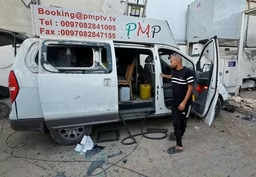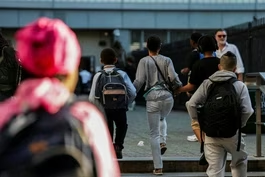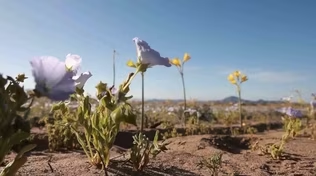
What to know about lymphedema after breast cancer treatment
Clip: 10/19/2025 | 7m 2sVideo has Closed Captions
What to know about lymphedema, a painful side effect of breast cancer treatment
The end of breast cancer treatment is cause for celebration, but for many patients, it can bring new challenges. Some studies show that up to 65% of women who undergo breast cancer surgery develop lymphedema, a painful swelling of tissue due to excess fluid retention. Ali Rogin spoke with two members of the nonprofit Lymphedema Education & Research Network to learn more.
Problems playing video? | Closed Captioning Feedback
Problems playing video? | Closed Captioning Feedback
Major corporate funding for the PBS News Hour is provided by BDO, BNSF, Consumer Cellular, American Cruise Lines, and Raymond James. Funding for the PBS NewsHour Weekend is provided by...

What to know about lymphedema after breast cancer treatment
Clip: 10/19/2025 | 7m 2sVideo has Closed Captions
The end of breast cancer treatment is cause for celebration, but for many patients, it can bring new challenges. Some studies show that up to 65% of women who undergo breast cancer surgery develop lymphedema, a painful swelling of tissue due to excess fluid retention. Ali Rogin spoke with two members of the nonprofit Lymphedema Education & Research Network to learn more.
Problems playing video? | Closed Captioning Feedback
How to Watch PBS News Hour
PBS News Hour is available to stream on pbs.org and the free PBS App, available on iPhone, Apple TV, Android TV, Android smartphones, Amazon Fire TV, Amazon Fire Tablet, Roku, Samsung Smart TV, and Vizio.
Providing Support for PBS.org
Learn Moreabout PBS online sponsorshipJOHN YANG: The end of breast cancer# treatment is cause for celebration,## but for many patients, it# can bring new challenges.## They can include lymphedema, painful swelling# of tissue due to excess fluid retention.## Some studies show up to 65 percent of women who# undergo breast cancer surgery develop lymphedema.
Ali Rogin spoke with two members of the nonprofit# Lymphedema Education and Research Network, Dr.## Stanley Rockson of Stanford Medicine, and retired# Army Colonel Susan Fondy, who's also a physician.
ALI ROGIN: Thank you both so much for being# here.
Dr.
Rockson, let's start with you.## Why is lymphedema so common# among breast cancer patients?
DR.
STANLEY ROCKSON, Stanford Medicine:# Lymphedema occurs because the lymphatic## system has been damaged.
And systematically# we have to do that, both to determine the## appropriate treatment for breast cancer and to# curtail the cancer.
So lymph nodes are removed,## but that creates damage.
80, 85 percent of the# time, that damage can be accommodated by the body,## but 15 percent of the time, it results in# malfunction, and that's what we call lymphedema.
And because breast cancer is so common# among women in the United States,## the numbers of people affected, even if it's# only 15 percent will be relatively large.
ALI ROGIN: Colonel Fondy, you were diagnosed with# stage three breast cancer and developed lymphedema## following your treatment.
But as a physician# yourself, when you were going in for consultation,## you asked questions about your risk.# What did doctors at the time tell you?
COL.
SUSAN FONDY (RET.
), Army: When I# was first diagnosed with breast cancer,## the surgeon saw me, and he talked to me about the## possible treatment options as far as surgery# went, but he never mentioned lymphedema.## And then he reached for the doorknob, and he# turned back and asked me if I had any questions.
And I said, what about lymphedema?# And he said, what about it?## And I was kind of surprised.
I just sort# of stammered, I don't want to get it.## And he said, you won't.
You're small.# And he was mistaken and misinformed.
The only risk factor that I did not# have for lymphedema was obesity,## but I had all of the other risk factors,# and he was just not educated in that.
And## he didn't know what to do about it,# so he didn't want to talk about it.
ALI ROGIN: When I was first diagnosed, I# was given a lymphedema compression sleeve.## Very quickly, my hand swelled up,# and then I was given a glove as well.## I have worn compression sleeves and gloves# day and night for more than 10 years.## I pursued a surgical option in 2016 and it# didn't help.
I pursued another surgical option## about a year ago and that I've seen# some big improvement from Dr.
Rockson.
ALI ROGIN: How common is it for# doctors who treat breast cancer to## not have a tremendous awareness of the potential# for and treatment options for lymphedema?
STANLEY ROCKSON: It's unfortunately# very common.
The situation is improving,## but not rapidly enough.
I did a# study back in 2004 to determine## what amount of time is spent in a medical# school education on the lymphatic system## in total and learned that on average it's 15# to 30 minutes out of a four year education.
So there's not really enough time to properly# educate clinicians on the diagnosis and## treatment of even a common disorder of# the lymphatic system if it's not studied.
ALI ROGIN: And Dr.
Rockson, walk us through# the spectrum of efforts and options to both## prevent getting lymphedema and then also# mitigating it once it's been detected.
STANLEY ROCKSON: The most important preventive# strategy, of course, is minimizing the number of## lymph nodes that need to be surgically excised.# And there has been a movement over the last 20## years progressively to accommodate that need.# Radiation protocols have also been curtailed in## such a way as to minimize lymphatic damage.
Then# we need surveillance and in well informed centers.
This occurs on a quarterly basis# over the next 24 months at a minimum.## And if we undertake aggressive treatment at that# point, we can actually prevent lymphedema in## about 50 percent of cases.
Once the lymphedema# occurs, then there is a very standard protocol## for physical interventions to# minimize the amount of edema that has## developed during that period of time and then# a maintenance regimen that includes compression## garments and devices and other approaches# to try to maintain that benefit over time.
ALI ROGIN: Colonel Fondy, I'd like to ask you# about what it's like living with this condition.## You recently retired as an army flight surgeon,## but how did it affect both your# military career and your everyday life?
SUSAN FONDY: It's something that causes you# to not be able to ever be done with cancer.## I have this thing that I look at or I have to# manage every minute of every day.
And in the## military, it was particularly bothersome, both# because I wasn't able to do some of the things I## needed to be able to do, but also because every# time I shook hands with somebody or saluted,## my lymphedema was front and center,# so I couldn't step beyond it.
ALI ROGIN: And Colonel Fondy, you have been# advocating on Capitol Hill in support of## federal funding for lymphedema research.# What is the state of those efforts?
SUSAN FONDY: In 2023, lymphedema# and lymphatic diseases were added## to a list of diseases that receive federal# funding for basic research.
This past year,## lymphedema and lymphatic diseases were dropped# entirely from the list, and nobody knows why.
So we've been advocating on Capitol Hill# to get lymphatic diseases added back## to that list of diseases that can compete for that# funding.
This is critically important because our## lymphatic researchers, they have not been able# to do the amount of research that is needed.
What we need on Capitol Hill is we# need one of the senators to be a hero.## We need them to step up and add lymphatic# diseases back to that list of diseases## so our researchers can continue doing# research for this very prevalent disease.
ALI ROGIN: Dr.
Stanley Rockson,## Colonel and Dr.
Susan Fondy, thank# you both so much for joining me.
SUSAN FONDY: Thank you so much.
STANLEY ROCKSON: Thank you.
Ceasefire violations strain fragile Israel-Hamas truce
Video has Closed Captions
Clip: 10/19/2025 | 5m 14s | Ceasefire violations in Gaza strain fragile truce between Israel and Hamas (5m 14s)
How the Trump administration is reshaping U.S. education
Video has Closed Captions
Clip: 10/19/2025 | 5m 32s | How the Trump administration is dramatically reshaping education in America (5m 32s)
News Wrap: Thieves steal priceless jewels from Louvre Museum
Video has Closed Captions
Clip: 10/19/2025 | 2m 44s | News Wrap: Thieves steal priceless jewels from Louvre Museum (2m 44s)
Scientists study rare bloom in the Atacama Desert
Video has Closed Captions
Clip: 10/19/2025 | 3m | Scientists study rare bloom in the Atacama Desert, one of the driest places on Earth (3m)
Providing Support for PBS.org
Learn Moreabout PBS online sponsorship
- News and Public Affairs

FRONTLINE is investigative journalism that questions, explains and changes our world.

- News and Public Affairs

Amanpour and Company features conversations with leaders and decision makers.












Support for PBS provided by:
Major corporate funding for the PBS News Hour is provided by BDO, BNSF, Consumer Cellular, American Cruise Lines, and Raymond James. Funding for the PBS NewsHour Weekend is provided by...



